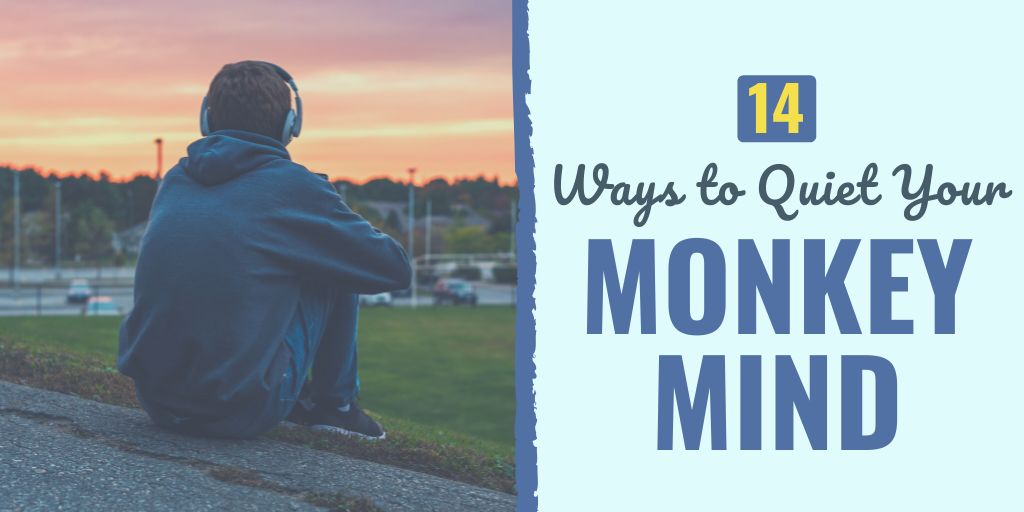I know what you are thinking.
How, do you quiet your insane monkey mind you ask? How do you cut through all the noise that constantly surrounds us and keeps us from finding peace?
Everything. Your “to do” list, your current feelings, your worries and fears for the future, what's for dinner tonight.
What does it take to get rid of all this noise and find peace and harmony?
Can you believe that we have about 50,000 different thoughts every single day, many of which are on the same topic? That is a lot to keep up with.
Over 2,500 years ago, Buddha taught himself how to calm his mind by observing the behaviors of other people and through his own experiences.
Buddha described the human mind as being so busy and overwhelmed, it was as if it had monkeys in it that continued to jump from branch to branch, chattering and screaming.
This is the basis for the phrase: Monkey Mind.
Each branch and monkey represents a human thought or emotion that is trying to gain the most attention. One monkey that is particularly loud is fear, which tries to take over every other thought in the mind by pinpointing everything that may go wrong.
Similar to a monkey swinging through branches, our minds let go of one thought only to grasp onto another, making our thoughts constantly arise and disappear.
This constant activity in your mind results in anxiety, worry, loss of sleep, and sometimes even anger. You might be afraid that your thoughts are out of your control.
A Monkey mind is exhausting, yet very common.
So, how can you work on quieting your monkey mind so you can have a sense of calm and well-being? The good news is that there are some tricks to get this accomplished. Here, we will cover 14 tips to help quiet your monkey mind and give you a better sense of peace.
What Causes Monkey Mind?
I know what you are feeling. You have a hard time living in the moment because your internal dialogue takes over your mind. Underneath your conscious awareness, you have this constant monkey mind, which carries your mind from one thought to another.
The cause of this monkey mind is our natural ability to think about many things at one time. The monkey mind tends to feed on stimuli, so if we present our minds with many things at once, they are likely to jump around from branch to branch without giving anything its true focus.
Adults often fail at living in the moment and being mindful of their surroundings because of this.
But consider this: We actually benefit from having the monkey on our side. The monkey keeps us on our toes and reminds us to stay on top of our busy lives.
Monkey Mind only becomes a problem when it will not quiet down. When the mind is constantly assaulted by negative thoughts, fears, and doubts, it results in mental fatigue due to over-stimulation.
Where Did the Term Monkey Mind Come From?
Buddha came up with the term “kapicitta,” which refers to the monkey mind. While all of these monkeys are creating chaos in our minds, jumping from branch to branch, Buddha urged his disciples to develop “a mind like a forest deer”.
Buddha noted that deer are especially gentle creatures who are able to remain aware and alert no matter what is going on. They can quiet anything that is distracting in the background and only focus on the here and now.
In order to quiet the mind, one must find inner peace through relaxation and meditation practices. One meditation practice that might be helpful for you to calm your anxieties and fears from all that mental activity is described by BJ Gallagher.
Think about it this way: When you breathe in and out, your mind is able to calm down and your thoughts begin to slow.
This form of meditation allows you to concentrate on counting from 1 to 10 and focus on your breathing, which will help prevent your mind from wandering. When your heart and breathing are working in unison, it will lock up the monkeys in the brain.
The ancient idea of monkey mind comes along with this ancient practice that is still widely used today. This is the only long-term and effective way to calm down the monkeys in your mind.
This Buddhist perspective of quiet meditation helps you understand your monkey mind, which then helps you to reason with your fears.
Through the meditative techniques of calming your mind, you allow yourself to realize that the terrible consequences of your fears are actually not so bad. What is the absolute worst that can happen?
We all have dreams, goals, plans, and most importantly, uncertainties. Living life with anxiety stops our ability to live in the moment and love our journey.
14 Tips for Quieting Your Monkey Mind
1. Understand you can control your monkey mind.
You must start by understanding that it is actually possible to control your anxious and overly active mind. Without realizing that you are in control, you have probably let your monkey mind run free. Here is where that ends.
Studies actually show that it takes a full 90 seconds to return to normal brain chemistry after neurochemical triggers excite your brain.
This means you need to stop and take a deep breath. Stop a rapid train of thought by thinking to yourself, “STOP!” before taking several deep breathes and moving on. You are then more likely to be able to address your thoughts with a clear and level head.
The truth is, by focusing on your breathing, you allow yourself distance from your anxious thoughts, making them easier to manage.
2. Create an “if-then” plan.
The point of an “if-then” plan is to be able to identify your triggers and focus on avoiding them rather than looking towards a final goal.
For example, if you know that your monkey mind becomes very active when you over-obligate yourself at work, then deal with that trigger. Decide ahead of time how much work you can reasonably take on and set those boundaries for yourself.
In short, take out the ingredients that create the fire so you are not left with a fire to put out. Nip the triggers in the bud.
3. Meditate.
Just as Buddha said, meditation is the primary way to tame your monkey mind. This video explains it very well. Essentially, if your monkey mind is going wild, give it a job: to focus on your breath. Tell the monkeys in your mind what to do.
You don't necessarily need a lot of concentration while you meditate. Just simply be aware of your breath, and the other small thoughts in the background will not matter.
Believe it or not, you can train yourself to meditate anywhere, even if it is just for a few seconds. You don't need to focus intently on clearing your mind of any thoughts. Just tell your mind to focus on your breath and it will follow your instructions.
4. Live in the moment.
What does it really mean to live in the moment? It is having the ability to consciously observe yourself in relation to your surroundings. It is being aware of your thoughts in comparison to the present moment.
Sure, it sounds simple—but having the ability to live in the moment is very effective when it comes to reducing stress and fostering control over your monkey mind.
Living in the moment is all about learning mindfulness. The movement of mindfulness originates from the idea that stress is caused by the incongruity between our thoughts and our surroundings.
Look at it like this: You may see other people become more successful than you and think to yourself that you should be more successful. This causes disharmony, which sends your monkey mind into a spiral of increasingly worse thoughts about yourself.
Instead, notice your thoughts, notice their triggers, and live in the moment.
5. Be an observer of your own thoughts.
This is not completely unlike tip #4—it just builds on it a bit more. While you are living in the moment, it is important to be aware of your thoughts so you can match them to your surroundings.
Part of this is doing the mental training of working to avoid judging your thoughts as being good or bad, but rather to notice you’re having them and analyze why you feel a certain way.
Observing your own thoughts is meant to lead to you questioning your stressful thoughts.
Because research has shown the overwhelmingly negative effects that stress has on your health, it is clear that being able to observe and control your own thoughts can not only help to calm your mind, but also improve your overall health.
6. Practice pranayama.
This practice of deep, slow breathing helps to center the mind and streamline any scattering thoughts. Pranayama is similar to meditation in the sense that you are stopping and only focusing on your breath, but it is a bit more simple to do at any given time.
Breathing exercises such as pranayama help you relax because they mimic the feeling of already being relaxed. This is one of the best ways to reduce stress in the body, as deep breathing sends the message to your brain to relax and calm the monkeys.
The brain is then able to send the same message to your body, which will help to reduce your heart rate, slow your breathing, and lower your blood pressure.
7. Practice qigong.
Qigong integrates physical postures, focused intentions, and breathing techniques. Qigong practices can vary from soft styles such as tai chi to vigorous styles like kung fu.
Qigong is an effective form of alternative medicine that creates an awareness of the mind that is not part of a traditional exercise program. The addition of mindful intent and deep breathing to physical movements increase the benefits of exercise exponentially.
The cool thing is, the gentle movements of qigong have many health benefits, including reducing stress, building stamina, increasing vitality, and boosting the immune system. Reestablishing the body, mind, and soul connection is a great way to quiet the monkeys inside your head.
8. Start a journal.
Keep a notepad with you for several weeks so whenever you feel that the monkeys in your mind are out of control, you can record your surrounding stimuli. Write down the time, who you're with, and what you're doing.
Be specific when recording your thoughts and feelings. This will help you to identify some of your triggers.
Believe it or not, certain sights, noises, smells, and even certain people may be a trigger for your stress. Keeping a journal will help you develop “if-then” statements so you can avoid your triggers as best as possible.

For example, say you notice from your journal that your mind really starts to run wild when you are in the grocery store during peak hours. The rushing around of people may cause you more stress than you realize.
If you notice this pattern in your journal, you can avoid going to the grocery store when you know it will be busy.
9. Come to grips with your past.
One monkey that is often particularly loud is the one that keeps reminding you of things that happened in the past. Traumatic events can leave monkeys in your head that constantly make you relive things that you wish had never happened.
The good news is that with therapy, counseling, or just personal realizations about past events, you will be able to eventually quiet down some of the loudest monkeys in your head.
This is easier said than done, of course. But make a conscious effort to come to terms with your past and the monkey will eventually move on too.
10. Practice yoga.
According to Cammi Vance, a New York City-based Bikram yoga instructor, your monkey mind is the part of your mind that is separated from your body and distracted from the present moment. This reflexive mind is always prepared to worry, judge, analyze, and compare your surroundings, which causes you to miss the moment.
Practicing yoga will give you a chance to connect with yourself, as well as give your mind a chance to welcome any healing that needs to be done. A monkey mind is an active and playful mind that is easily distracted.
Through yoga, you can learn how to quiet your mind at any given moment. Yoga helps you learn how to push the monkey aside and allow yourself the inner peace that you deserve.

11. Use mantras or affirmations to quiet the monkeys.
Believe it or not, something as simple as reciting a mantra can interrupt your monkey mind. When reciting a mantra, you are reeling in your scattered thoughts and focusing on a single word or phrase.
Some calming mantras include:
You can silently recite your mantra, or say it out loud so you are actually listening to the phrase. Hearing the phrase out loud will further distract your monkey mind.
Get some great examples of affirmations/mantras and learn how to craft your own personal affirmations by checking out this post: 1,132 Positive Affirmations: Complete Guide to Simple Mantras
12. Practice gratitude.
Starting each day with gratitude will help set the tone of your day. Reflect on what you are grateful for, which will shift your focus from what you don't have to what you do have.
In fact, research actually shows that repeated thoughts create neural pathways. This means that the more you are able to focus on the positive aspects of your life, the more permanent those pathways become.
With time, practicing gratitude will train your brain to reflexively find the positive in things. Take some time each day to give thanks for the positive things in your life. Having an attitude of gratitude will help quiet the negative monkeys.
13. Build focus.
A large part of staying focused is having a plan and sticking to it. Paying attention to your thoughts and goals without being distracted can be a difficult task, but there are a few simple techniques you can do to help master this practice:
Did you know that studies show it takes an average of 23 minutes and 15 seconds to regain focus once you lose it?
This is partly because, each time you lose focus, the monkeys in your head that were dormant become active, and you need to then take the time to quiet them down again. When you are able to become really focused, the monkeys stay silent and asleep.
It’s becoming increasingly difficult to stay focused while working. Fortunately, there are a variety of strategies you can use to increase your concentration, focus, AND productivity. Watch the video below to learn about 7 simple habits to stay focused at work while avoiding stress and burnout.
14. Practice mindfulness.
There are a few specific things you can teach yourself to practice the mindfulness you need to quiet those loud monkeys. First, realize that passing thoughts are normal and can't be chased away by willpower.
Trying to fight these monkeys is counter-productive. Instead, notice your thoughts and acknowledge them. You can then tell yourself that you will address those thoughts at a later time.
You have to repeatedly and compassionately create your intention to be in the present. Compassion is at the heart of mindfulness.
When the monkeys are being loud, take a compassionate approach to quiet them down and getting back on track. Cultivating this compassion, even with a persistent monkey mind, lets you become less negative and reactive.
Final Thoughts on How to Quiet Your Monkey Mind
Having a monkey mind is normal—it happens to everyone. The trick is to learn how to quiet down your monkey mind so you can live a more peaceful life.
It is important to not let the monkeys take over, but rather to learn how to take control and have them listen to your commands. Get the monkeys to be on your side so they don't interfere with your success.
I encourage you to face your monkey and regain control of your life that you deserve. Have you had success in quieting the monkeys in your mind? Share your experiences to help other people learn how to master this.
And if you're looking for some inspiration and encouragement, check out these blog posts:
- 35 Silence Quotes About the Power of Quiet Reflection
- 43 Priority Quotes to Focus on What’s Important in Life
- 155 Best Gratitude Quotes and Sayings to Inspire an Attitude of Gratitude
Finally, if you want to take your goal-setting efforts to the next level, check out this FREE printable worksheet and a step-by-step process that will help you set effective SMART goals.




What a great term ‘Monkey Mind’ – that’s the perfection description. My monkeys seem to be nocturnal, doing most of their incessant chattering and leaping around my head if I can’t sleep… or maybe that’s why I can’t sleep! I have found that listing everything I’m grateful for is the best way to make them quiet – if I dry up whilst thinking randomly, I use categories such as health, home environment or experiences from travels. I’ll definitely try the journaling approach though. Reading this it seems very likely there are some common triggers that set the monkeys off. Thanks Steve, I’ve shared and saved this on my favorites bar to come back and back to.
Yup. Those nocturnal monkeys do make sleep difficult! 🙂 Thanks for a great comment Laura!
The animal in the cover photo isn’t a monkey, though. That’s an ape.
Yes buts its mind is a monkey.
I just realized today how much my Monkey Mind controls my daily life. I have a lot to learn from reading this.
The Monkey Mind is a very interesting concept in Buddhist teachings. This voice inside of our head that is always speaking to us, and guiding our future can only be silenced through meditation. Silencing our Monkey Mind should be the goal for all of us.